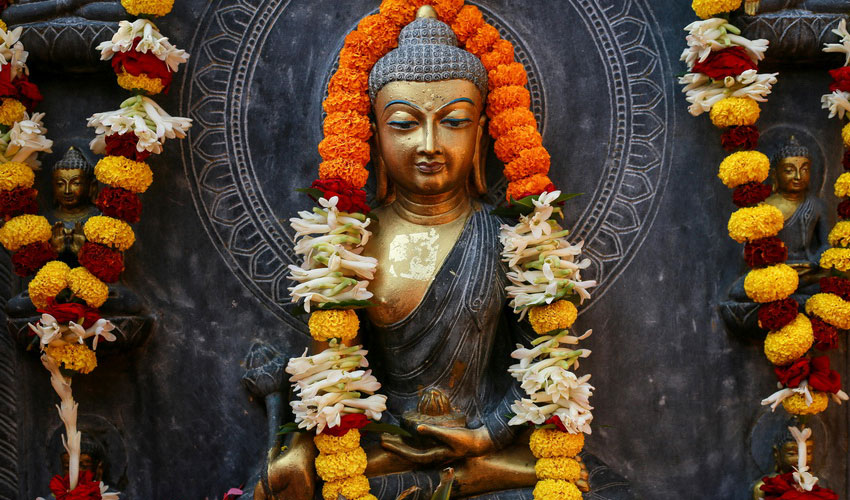Buddhism & Morality
Having lived in a Buddhist country for over 23 years now, I feel it's time to share my insights on this ancient and profound religion. Buddhism has also gained significant popularity in the Western world, prompting me to write this article for those who might be curious about its teachings. While my experience is rooted in the context of Thailand, I aim to discuss Buddhism as a whole and present it in simple, accessible language. At its core, Buddhism focuses on the liberation of the mind. This is a journey toward freedom from suffering and misunderstanding. To guide people on this path, the Buddha introduced three essential practices: Morality, Concentration, and Wisdom. These are called sīla, samādhi, and paññāi in Pali, respectively. Each of these three trainings is interconnected and reinforces the others. Morality (sīla) lays the foundation for a harmonious life, encouraging ethical behaviour and compassion towards others.
Concentration (samādhi) helps to cultivate a focused and calm mind, creating clarity that allows us to see things as they truly are. The ultimate goal of practicing Buddhism is to develop wisdom (paññā). Through wisdom, practitioners come to understand profound truths about the nature of existence: that everything is subject to change, that life often brings dissatisfaction, and that there is no fixed self at the core of our being. However, gaining this deep understanding isn't something you can achieve overnight. It requires the support of both concentration and moral conduct. In essence, developing wisdom is impossible without first establishing a strong foundation of morality and mental clarity. These components work together harmoniously, guiding believers on their path to enlightenment and peace of mind. By exploring Buddhism in this way, I hope to shed light on its teachings and encourage others to delve into this transformative journey.

The teachings of the Buddha rest on two foundational principles that are so crucial they can be encapsulated in a single line from the Dhammapada, which is one of the most cherished and widely read texts in Buddhism. This line states: "Abandon what is harmful, cultivate what is beneficial, and purify your mind." Let’s break this down. The phrases "abandon what is harmful" and "cultivate what is beneficial" focus on the importance of developing sīla, which translates to moral conduct or ethical behaviour. This means letting go of actions and thoughts that cause harm to ourselves and others, while actively engaging in practices that promote kindness, compassion, and goodness.
The concept of purifying the mind refers to the practice of samādhi (Concentration), which involves cultivating deep concentration and mental clarity. When our minds are pure and focused, we create the perfect environment for wisdom, or paññā, to develop. This wisdom isn’t just about knowledge; it’s about gaining a profound understanding of how everything in our lives is interconnected. True wisdom comes to life when we start recognising how these elements of morality, concentration, and understanding work together as parts of the Eightfold Path. It’s essential to nurture each aspect harmoniously; just as you wouldn’t want to neglect one section of an orchestra while others play on, all elements must be cultivated to create a balanced and enriching practice.
For anyone interested in following the Buddha’s path, establishing a strong foundation in moral training should be a priority. By prioritising our ethical behaviour, we set ourselves up for deeper mental clarity and wisdom. So, as you embark on this journey, remember: returning to the essentials of good conduct, focused meditation, and developing a clear mind will guide you toward the understanding you seek.

Living a life rooted in morality brings a profound sense of peace, free from the turmoil of restlessness and the burden of regret. When we manage to escape these feelings of unease and guilt, we draw closer to achieving a state of deep concentration and tranquillity, known as samādhi. When we attain samādhi, we open ourselves up to a greater understanding, referred to as paññā. This newfound wisdom fuels a stronger desire to embrace sīla (Morality), the principles of ethical conduct. As we reflect on our own experiences, we discover how sīla enhances our ability to love and show compassion, leading to peace both within ourselves and in our interactions with others.
Moreover, adhering to moral principles instils a healthy awareness of the potential consequences of our actions, serving as a protective mechanism. This awareness can either come from a fear of facing negative outcomes or from an inner sense of shame when we act against our moral values. In Buddhism, these feelings are considered guardians of our ethical lives. Ultimately, practicing morality becomes not just another obligation we must follow, but a source of joy and fulfilment. This creates a positive feedback loop: the more we engage in wholesome behaviour, the more we cultivate peace and understanding, leading us to a richer and more meaningful existence.
The practice of sīla, or moral conduct, plays a crucial role in the journey toward personal liberation in many meaningful ways. One key aspect of sīla is its connection to mindfulness, known as sati. To maintain high moral standards, it’s essential to cultivate a keen awareness of your thoughts, words, and actions. Sati refers to this mental alertness that allows you to be aware of what’s happening in your mind at every moment. When your mindfulness is strong, it helps you avoid even the tiniest missteps. High levels of sati are necessary for deeper concentration, known as samādhi, which further enhances your meditation practice. On the flip side, if your sīla is lacking, it often indicates that your mindfulness isn’t strong enough, leading to only shallow focus during meditation. This lack of depth can hinder the development of wisdom.
Additionally, sīla serves as a powerful antidote to desire. We know that desire is a root cause of much of the suffering we experience in life. By embracing sīla, you might feel the urge to act on certain desires, but you choose to refrain because you understand that such actions often lead to long-term pain and suffering. In this way, sīla helps to control your desires on a daily basis. Lessening your desires is also essential for achieving deeper states of samādhi. When your desires diminish, meditation becomes easier. And as your meditation practice improves and enters a deeper state, it creates a positive feedback loop, allowing you to distance yourself even more from those desires. In summary, by strongly integrating sīla into your life, you set the foundation for mindfulness, effective meditation, and ultimately, greater wisdom and freedom from suffering.

*Ahba has often remarked that if you find yourself captivated by desire, it may be wiser to forgo meditation. However, for those who seek a clear and liberated mind, meditation is the path to take. Slowly, yet surely, it helps you transcend the grip of desire. *Emerging from the dense woods near Taunggyi in Myanmar during the 1950s, Ahba, meaning 'father' in Burmese, reinvented himself as a monk shrouded in mystery. He seldom speaks of his own past, yet a glimpse into his life reveals a remarkable presence at the sixth Buddhist Council meeting in 1954. There, he garnered immense respect for his profound mastery of samatha meditation, a discipline of focused concentration that speaks to his deep spiritual journey and dedication to the practice.
If you aim to enhance your meditation practice, incorporating sīla is crucial. Sīla refers to ethical conduct and living in a way that reflects respect and kindness toward yourself and others. Unlike some aspects of meditation that you might eventually put aside, practicing sīla is an ongoing journey without a finishing line. In fact, as you progress in your meditation practice, you will find that the principles of sīla become even more significant. The deeper you dive into meditation, the more essential it is to cultivate a foundation of ethical living. Think of sīla as the bedrock on which your meditation grows. Stronger sīla leads to a richer and more profound meditation experience. So, embrace sīla wholeheartedly; it’s not just a preliminary step, but a lifelong companion in your meditative journey.
A Practical Guide to the Five Precepts
What does it really mean to act morally in Buddhism? For everyday people, the Buddha offered a set of guiding principles known as the Five Moral Precepts (or pañca-sīla), which can also be understood as the five virtues. These precepts stand as essential advice from the Buddha, emphasising the importance of ethical living. Here’s what they entail:
- Refrain from taking life
- Refrain from stealing
- Refrain from engaging in sexual misconduct
- Refrain from dishonest or harmful speech
- Refrain from using intoxicating substances that cloud your judgment
These five precepts align closely with key elements in the Eightfold Path, specifically the principles of Right Action, Right Speech, and Right Livelihood. It’s important to note that these are precepts, not strict commandments. The Buddha didn’t impose these rules on anyone; rather, he encouraged people to adopt them through their own will and understanding. Adherence to these precepts must come from a genuine internal desire. At first glance, following these guidelines might seem straightforward, leading some to think, “I already do this.” However, if you incorporate them into your daily practice, you'll soon realise they're more complex than they appear. Each precept holds profound significance and requires deep reflection and commitment. Not only do they ask us to refrain from certain actions, but they also challenge us to cultivate positive qualities within ourselves, reflecting a more compassionate and mindful way of living.

What does it mean to behave morally in Buddhism? To help everyday people understand, the Buddha introduced five fundamental principles known as the Five Precepts (or pañca-sīla), which can also be seen as guiding virtues. These precepts serve as a practical roadmap for leading a moral life. One of the key teachings of the Buddha is the importance of intention behind our actions. However, this doesn’t mean you can excuse wrongful actions by claiming ignorance or suggesting you had good intentions. Simply saying you "meant well" is not enough to make your actions moral. Instead, the Buddha teaches us that our thoughts and consciousness play a crucial role in shaping our behaviour, and the outcomes of our actions will naturally flow from them.
The Dhammapada, a revered text in Buddhism, captures this idea beautifully in its first verse. It reminds us that our conscience and intentions set the stage for what we do, influencing not only our actions but also the consequences that follow. In other words, being aware of your thoughts and intentions is essential when striving for moral behaviour. Here is what the first verse says: “Mind is the forerunner of all things, mind is their leader, they are made by the mind. When someone speaks or acts with impure thoughts, suffering follows, like the wheel follows the hoof of the ox.” The journey of practicing sīla, or moral discipline, starts with letting go of certain behaviours and desires, even if you don't fully understand the reasons behind them. At first, these may simply seem like rules to follow. However, as you delve deeper into your practice, you will gain clarity and insight into your own mind. This growing awareness will allow you to identify the root causes of your thoughts and actions, giving you a clearer path to transformation and growth.
Let us have a closer look at the rich dimensions of each precept, uncovering the profound beauty they hold. Yet, the true transformative power of these teachings lies in their integration into your everyday life. Embrace them, and you will discover their positive impact unfolding around you.
Refrain From Taking Life
The first precept emphasises the importance of refraining from killing, a principle that might initially seem straightforward, especially if you don't plan on harming anyone. However, this precept extends beyond human beings to encompass all forms of life, including animals, insects, and other creatures. It also includes the commitment to avoid self-harm or suicide. Central to this precept is the significance of intention. If, for instance, you unknowingly step on an ant while walking down the street, you shouldn’t feel guilt or accumulate negative karma. But if you see the ant, adhering to this precept means you should consciously step aside to avoid harming it. Consider a mosquito that stings you. You might instinctively want to swat it in response to the irritation. This instinct serves as a reminder of the practice at hand, one that encourages mindfulness, actively resisting the impulse to harm living beings. This mindfulness, known as sati, prompts us to reflect on our responses and choose compassion over aggression.
It's essential to note that the precept is not only about physical actions; it also encompasses our words and thoughts. Encouraging someone else to cause harm is as serious as inflicting harm yourself, as the intent to kill behind those words is the same. This raises a common question: Should a Buddhist strictly follow a vegetarian diet? Many people debate this issue but I should mention here that the Buddha himself did not advocate for vegetarianism, nor did the monks of his time. Beyond actions and speech, the precept calls for a deeper exploration of our minds. It’s not enough to avoid physical harm; we must also work to eliminate thoughts of malice. Diminishing these harmful inclinations is part of cultivating kindness and compassion within ourselves. This precept informs us that abstaining from killing should foster an active intention to do no harm out of malice. The antidote to harmful thoughts and actions is loving-kindness, known as mettā. By nurturing this quality, we create a safe and peaceful environment for all beings. Ultimately, by living according to this precept, we can become a refuge of non-violence and a source of peace for the world around us.

Refrain From Stealing
The second precept emphasises the importance of refraining from stealing but its meaning runs much deeper than simply avoiding theft. It can be more accurately understood as "abstaining from taking what is not given." This precept is rooted in a profound respect for the belongings and space of others. It's not just about refraining from breaking into a home or robbing someone; it also involves recognising and honouring personal property in all its forms. For instance, borrowing an item without permission, moving someone else's belongings without asking, or encroaching on someone's personal space or time are all violations of this principle. Wasting someone’s time is just as detrimental as taking their physical possessions. Moreover, encouraging others to steal is also against this precept. At a deeper level, this teaching addresses the mindset of greed, the insatiable desire for what belongs to others. It invites us to cultivate generosity, or dāna, as a counterbalance to this greed. Generosity can take many forms: sharing material goods, imparting knowledge of the Dhamma, or even giving your time and attention. By practicing dāna, we can begin to detach ourselves from the notion that things possess inherent value or that they belong to a specific "self." This mindset fosters a gradual dissolution of the ego, helping us see beyond the confines of "mine" and "yours," ultimately revealing the interconnectedness of all beings.
Refrain From Engaging in Sexual Misconduct
Though the Buddha and his monks embraced celibacy and often emphasised that desire leads to the dissatisfaction of existence, he did not condemn sexual activity among laypeople. However, he was clear in his opposition to sexual misconduct. To illustrate this, he described acts that violate the trust and well-being of others, such as engaging with someone who is under parental protection, cheating on a partner, or committing unwanted or abusive acts. At its core, sexual misconduct is any act that causes harm to another person. Additionally, it often stems from unchecked sensory desire; the pursuit of pleasurable experiences can become so overpowering that it clouds our judgment and neglects the welfare of ourselves and others. Regaining control over these desires is crucial, and this can be accomplished through practices like meditation, specifically samatha meditation, or concentration meditation as well as by adhering to moral guidelines. Ultimately, cultivating the quality known as nekkhamma, or renunciation, serves as an antidote to sexual misconduct. Nekkhamma involves freeing oneself from sensory desires, which entails recognising and letting go of these impulses whenever they arise in the mind. This practice aligns with the principle of Right Intention within the Eightfold Path and fosters a profound sense of contentment. In addition to developing nekkhamma, it is vital to nurture respect for others and loyalty to one’s partner, further reinforcing a life lived in harmony and integrity.
Refrain From Dishonest or Harmful Speech
The fourth precept emphasises the importance of abstaining from wrong speech, a challenge many of us face in our daily lives. Practicing right speech means:
- Not Lying
- Avoiding Language that Creates Division
- Steering Clear of Rudeness
- Refraining From Gossip
This precept encourages you to be mindful of your conversations, even in casual settings like the coffee machine at work. It means resisting the temptation to gossip or use harsh words. When you reflect on your daily interactions, you may realise just how difficult this can be. For instance, avoiding divisive comments means not saying things that can lead to conflict among persons or groups. Moreover, the precept also prohibits any form of lying, including seemingly harmless “white lies.” The Buddha teaches that lying is like stopping on the road and discarding everything you’ve worked for; only by speaking the truth can you truly grasp reality. For a deeper understanding, consider reading the teachings on Right Speech from the Eightfold Path, which highlight the significance of this precept. It's important to remember that wrong speech encompasses all forms of communication, including non-verbal and written interactions. Mentally, it calls for refraining from false and disrespectful thoughts and overcoming the illusions that our untrained minds often create. On the proactive side, this precept encourages the cultivation of honesty and truthfulness (sacca). When you commit to speaking the truth, you align yourself with reality, fostering harmony in your life and the lives of those around you. You cultivate a gentle and friendly demeanour, becoming a trustworthy presence that others appreciate. Your words inspire confidence, relieving others from worrying about what you might say, whether they are present or not. In this way, you contribute to a sense of peace and tranquillity in the world around you.

Refrain From Using Intoxicating Substances that Cloud Your Judgment
The final precept encourages us to avoid intoxicants that cloud our attention, a crucial consideration. The phrase "that cloud our attention" is particularly important because this guideline specifically addresses substances that interfere with sati, or mindfulness. Alcohol is the most prevalent of these substances, but it profoundly divides the mind, making true mindfulness and concentration, or samādhi, unattainable. Those who drink alcohol place themselves in a state that fundamentally conflicts with the teachings of the Buddha. The primary goal of this precept is to protect your mind from becoming weakened or losing control, which can lead to the violation of other precepts. When your mind is incapable of maintaining mindfulness (sati), it poses a significant risk to your commitment to moral conduct (sīla). Consider the harmful behaviours often fuelled by alcohol and similar substances, and the importance of this guideline becomes evident. If you aspire to develop sīla in every aspect of your life, there can be no exceptions. Not even for a single glass of wine. Renouncing this indulgence is a way of counteracting desire and resisting the impulse to always indulge our cravings. If you choose to disregard this precept, avoid deluding yourself into thinking that it is acceptable. Don’t justify such behaviour by claiming to be a 'free spirit' or that you're maintaining a connection to normal society. If you struggle to uphold this principle, acknowledge that your desires still hold sway over you. Moreover, it’s essential to recognise that the mind can become intoxicated without any external substances. Intense desires or deep aversions can disrupt our internal peace and control. This highlights the importance of actively cultivating mindfulness; it is the development of sati that keeps our minds balanced. Mindfulness is the foundation of all precepts, while a deficiency in sati frequently leads to the breach of them.
“Choose words that bring peace, not conflict.” – Gautama Buddha






















